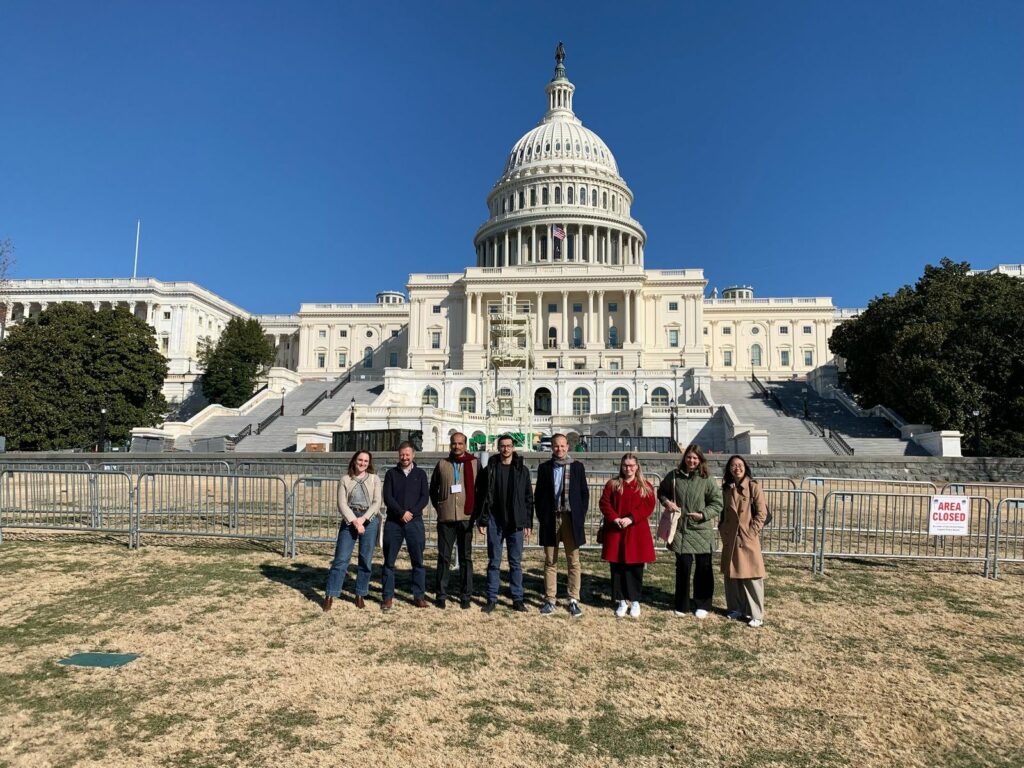
The Future of Artificial Intelligence Uncovered: Lessons from an International Delegation to the U.S.
Article, Friedrich Naumann Foundation, Mar 25 (EN)
This article was written by Claudia Del Pozo for the Friedrich Naumann Foundation in Mexico. The original version in Spanish can be found here.
After years of global alignment prioritizing responsible use above all other goals, the United States abruptly took a different direction with the removal of key executive orders in the early days of the Trump Administration. The country’s new focus on AI was unveiled in the executive order “Removing Barriers to American Leadership in Artificial Intelligence.” The country will now focus on advancing “global dominance in AI” to promote human development, economic competitiveness, and national security (White House, 2025).
This disruption of the global consensus was amplified at the Paris AI Action Summit in early February when the United States and United Kingdom refused to sign the Statement on Inclusive and Sustainable Artificial Intelligence for People and Planet. The document called for the development of open, inclusive, transparent, ethical, secure, and trusted AI systems, taking into account international frameworks for all. In response to this decision, JD Vance explained, “We believe that excessive regulation of the AI sector could kill a transformative industry just as it’s taking off. We feel very strongly that AI must remain free from ideological bias and that American AI will not be co-opted into a tool for authoritarian censorship.” (Hallam, 2025).
It was in this context of a changing political landscape that the Friedrich Naumann Foundation’s World Order and Globalization Hub organized the trip of an international delegation to Washington, DC, and San Francisco, seeking to generate understanding and expertise. The delegation included seven AI experts from across the world, including entrepreneurs, parliamentarians and members of think-tanks: Belgium, Brazil, India, Mexico, Thailand, Tunisia and Turkey. Over the course of a week, delegates had the opportunity to engage in dialogue with leaders in the U.S.’ AI ecosystem, from government to industry, civil society and academia.
The Delegation in Washington DC
xx
Optimism for AI
The first thing that caught the delegation’s attention, and undoubtedly the biggest surprise, was the calm with which the leaders faced a situation that, from the international panorama, was perceived as absolute chaos. Some activities were paused while more clarity was defined about the priorities of the federal government, generating a bit of uncertainty as to the continuity of the advanced work. Several people noted that they are confident that the Trump administration will provide more clarity on the future of AI in the country.
Despite AI policy changes at the national level, there are reasons to remain optimistic about the responsible future of AI in the United States. First, members of the House of Representatives assured that interest on the part of lawmakers from both the Democratic and Republican parties remains strong. The House Homeland Security Committee’s Subcommittee on Cybersecurity and Infrastructure Protection anticipates that there will be no less legislation, but less targeted legislation. Second, while consensus on how to move forward is lacking, according to the Bipartisan Policy Center, some issues manage to bring both parties together such as AI applications for the public good and protecting minors from AI risks. From the Office of Senator Martin Heinrich of New Mexico, they shared that mutual interest has been noted on certain issues (tools to train the workforce in AI, intellectual property and the use of AI for military purposes) as well as bipartisan bills. The latter include privacy, intellectual property and deepfake pornography issues. Third, the Wilson Center highlighted the capabilities of some of the AI team in the Trump Administration, in particular Michael Kratos, Science and Technology Advisor to the President, and Lynne Parker, Executive Director of the President’s Council of Advisors on Science and Technology and Deputy Director of the Office of the President’s Science and Technology Advisor.
The Delegation also visited San Francisco
Challenges for Responsible AI
However, optimism aside, it is also necessary to talk about the challenges in driving the responsible use of AI in the United States. On the one hand, there is the current administration’s belief that regulation and innovation are opposites. However, as highlighted by members of the Wilson Center, regulation can drive innovation, exemplifying how seat belts enabled cars to go faster. On the other hand, while there is consensus on broad goals such as AI contributing to the public good, considerable disagreement persists between and within parties. For example, when asked what is the area of least consensus between Democrats and Republicans, representative from the Office of Senator Martin Heinrich referred to pre-release requirements for AI systems and their scope, with the majority of the Democratic party believing that there should be controls in place before releasing a system to the public. Finally, the biggest deterrent to potential federal regulation of AI in the U.S. is considered to be the lack of up-to-date privacy regulation at the federal level. That said, the use of data by the Department of Government Efficiency (DOGE) is driving a possible update to the U.S. Federal Privacy Act of 1974 (Oremus and Jimenez, 2025).
That said, the good news is that different state governments are taking it into their own hands to ensure responsible use of AI systems, given the lack of action at the federal level. Last year, California passed 18 AI bills, according to the San Francisco Mayor’s Office. One of these bills requires the administration to register the AI systems they are using including information about the service provider, the data and their interaction with the community and individuals, among others. These efforts are also being joined by the public sector, with a considerable number of Silicon Valley startups exploring how to create solutions that favor responsible AI systems, generally seeking to be acquired by the big tech companies.
A pesar de los cambios de rumbo de política de IA a nivel federal en Estados Unidos, este viaje permitió constatar que existen personas en todos los sectores comprometidas con un uso e impacto responsable de la IA. Pero sobre todo, esta experiencia demuestra el valor incomparable de los intercambios directos entre expertos de distintos países. En un momento de transformación global en torno a la IA, esta iniciativa de la Fundación Friedrich Naumann permitió al grupo de personas expertas ir más allá de las narrativas mediáticas y comprender una realidad compleja de primera mano. La diversidad de perspectivas y experiencias compartidas durante esta semana representa el tipo de cooperación global que se necesita para enfrentar los desafíos y aprovechar las oportunidades que la IA ofrece.

